Related Research Articles

The Medical Research Council (MRC) is responsible for co-coordinating and funding medical research in the United Kingdom. It is part of United Kingdom Research and Innovation (UKRI), which came into operation 1 April 2018, and brings together the UK's seven research councils, Innovate UK and Research England. UK Research and Innovation is answerable to, although politically independent from, the Department for Business, Energy and Industrial Strategy.
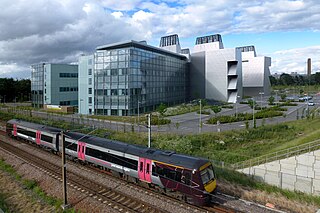
The Medical Research Council (MRC) Laboratory of Molecular Biology (LMB) is a research institute in Cambridge, England, involved in the revolution in molecular biology which occurred in the 1950–60s. Since then it has remained a major medical research laboratory at the forefront of scientific discovery, dedicated to improving the understanding of key biological processes at atomic, molecular and cellular levels using multidisciplinary methods, with a focus on using this knowledge to address key issues in human health.

Dame Kay Elizabeth Davies is a British geneticist. She is Dr Lee's Professor of Anatomy at the University of Oxford and a Fellow of Hertford College, Oxford. She is director of the Medical Research Council (MRC) functional genetics unit, a governor of the Wellcome Trust, a director of the Oxford Centre for Gene Function, and a patron and Senior Member of Oxford University Scientific Society. Her research group has an international reputation for work on Duchenne muscular dystrophy (DMD). In the 1980s, she developed a test which allowed for the screening of foetuses whose mothers have a high risk of carrying DMD.

The Cambridge Biomedical Campus is the largest centre of medical research and health science in Europe. The site is located at the southern end of Hills Road in Cambridge, England.
The Sir William Dunn School of Pathology is a department within the University of Oxford. Its research programme includes the cellular and molecular biology of pathogens, the immune response, cancer and cardiovascular disease. It teaches undergraduate and graduate courses in the medical sciences.
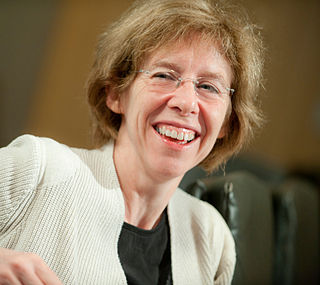
Fiona Watt, is a British scientist who is internationally known for her contributions to the field of stem cell biology. In the 1980s, when the field was in its infancy, she highlighted key characteristics of stem cells and their environment that laid the foundation for much present day research. She is currently director of the Centre for Stem Cells & Regenerative Medicine at King's College London, and Executive Chair of the Medical Research Council (MRC), the first woman to lead the MRC since its foundation in 1913. On 13 July 2021 she was appointed as the new Director of the European Molecular Biology Organization (EMBO).
Richard Lewis Huganir is a Bloomberg Distinguished Professor in the Departments of Neuroscience and Psychological and Brain Sciences, Director of the Solomon H. Snyder Department of Neuroscience, and co-director of the Johns Hopkins Medicine Brain Science Institute at the Johns Hopkins University School of Medicine. He has joint appointments in the Department of Biological Chemistry and the Department of Pharmacology and Molecular Sciences in the Johns Hopkins School of Medicine.
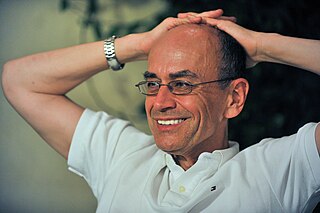
Thomas Christian Südhof, ForMemRS, is a German-American biochemist known for his study of synaptic transmission. Currently, he is a professor in the school of medicine in the department of molecular and cellular physiology, and by courtesy in neurology, and in psychiatry and behavioral sciences at Stanford University.
Andrea Hilary Brand is the Herchel Smith Professor of Molecular Biology and a Fellow of Jesus College, Cambridge. She heads a lab investigating nervous system development at the Gurdon Institute and the Department of Physiology, Development and Neuroscience. She developed the GAL4/UAS system with Norbert Perrimon which has been described as “a fly geneticist's Swiss army knife”.
David Barford is a British medical researcher and structural biologist at the MRC Laboratory of Molecular Biology Cambridge, UK.
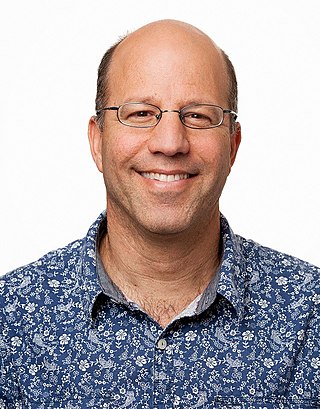
Professor Ilan Davis is a professor of Cell Biology and Wellcome Investigator at the Department of Biochemistry, University of Oxford. Previously (1996-2007) he was a Professor and Wellcome Trust Senior Fellow (2002-2007) at the Wellcome Trust Centre for Cell Biology, University of Edinburgh. In 2011, he was elected as an EMBO fellow.

Volker Haucke is a biochemist and cell biologist. He is Director of the Leibniz-Forschungsinstitut für Molekulare Pharmakologie Berlin (FMP) Berlin and Professor of Molecular Pharmacology at the Institute for Pharmacy of the Free University of Berlin.

Sarah Amalia Teichmann is a German scientist who is head of cellular genetics at the Wellcome Sanger Institute and a visiting research group leader at the European Bioinformatics Institute (EMBL-EBI). She serves as director of research in the Cavendish Laboratory, at the University of Cambridge and a senior research fellow at Churchill College, Cambridge.

Jane Clarke is an English biochemist and academic. Since October 2017, she has served as President of Wolfson College, Cambridge. She is also Professor of Molecular Biophysics, a Wellcome Trust Senior Research Fellow in the Department of Chemistry at the University of Cambridge. She was previously a Fellow of Trinity Hall, Cambridge. In 2023, she was elected to the National Academy of Sciences.
David Chaim Rubinsztein FRS FMedSci is the Deputy Director of the Cambridge Institute of Medical Research (CIMR), Professor of Molecular Neurogenetics at the University of Cambridge and a UK Dementia Research Institute Professor.

Hilmar Bading is a German physician and neuroscientist. He is a member of the German National Academy of Science Leopoldina.
Sir David Ian Stuart is a Medical Research Council Professor of Structural Biology at the Wellcome Trust Centre for Human Genetics at the University of Oxford where he is also a Fellow of Hertford College, Oxford. He is best known for his contributions to the X-ray crystallography of viruses, in particular for determining the structures of foot-and-mouth disease virus, bluetongue virus and the membrane-containing phages PRD1 and PM2. He is also director of Instruct and Life Sciences Director at Diamond Light Source.

(Edith) Yvonne Jones is director of the Cancer Research UK Receptor Structure Research Group at the University of Oxford and a Fellow of Jesus College, Oxford. She is widely known for her research on the molecular biology of cell surface receptors and signalling complexes.
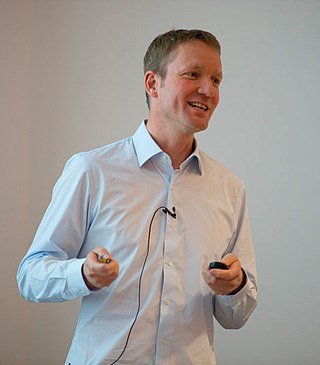
Jan Löwe is a German molecular and structural biologist and the Director of the Medical Research Council (MRC) Laboratory of Molecular Biology (LMB) in Cambridge, UK. He became Director of the MRC-LMB in April 2018, succeeding Sir Hugh Pelham. Löwe is known for his contributions to the current understanding of bacterial cytoskeletons.

The MRC Weatherall Institute of Molecular Medicine at the University of Oxford is a research institute located at the John Radcliffe Hospital in Oxford. Founded in 1989 by Sir David Weatherall, the institute focuses on furthering our understanding of clinical medicine at a molecular level. It was one of the first institutes of its kind in the world to be dedicated to research in this area.
References
- 1 2 "LMB welcomes Radu Aricescu at new Group Leader", MRC Laboratory of Molecular Biology, 2 May 2017. Retrieved 6 June 2017.
- ↑ A. R. Aricescu, I. W. McKinnell, W. Halfter, A. W. Stoker, "Heparan sulfate proteoglycans are ligands for receptor protein tyrosine phosphatase sigma", Molecular and Cellular Biology, vol. 22, issue 6 (2002), pp. 1881–1892.
- ↑ A. R. Aricescu, W. Lu, E. Y. Jones, "A time- and cost-efficient system for high-level protein production in mammalian cells", Acta Crystallographica: Section D, Biological Crystallography, vol. 62, issue 10 (2006), pp. 1243–1250.
- ↑ The University of Oxford Gazette, 27 January 2011, no. 4941, vol. 141. Retrieved 22 January 2017.
- ↑ "Recognition of Distinction: Successful Applicants 2016", The University of Oxford Gazette, no. 5143, vol. 147, 29 September 2016. Retrieved 21 January 2017.
- ↑ "Professor A. Radu Aricescu", Nuffield Department of Medicine. Retrieved 22 January 2017.
- ↑ "Professor A. Radu Aricescu", Division of Structural Biology. Retrieved 22 January 2017.